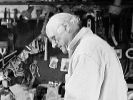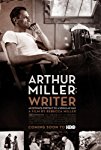Eye For Film >> Movies >> Arthur Miller: Writer (2017) Film Review
Arthur Miller: Writer
Reviewed by: Anne-Katrin Titze

Plays according to Arthur Miller are never finished but abandoned as you get closer to the hidden meaning. It is really all about "approaching the unwritten, the unspoken and the unspeakable. The closer you get the more [there is] life to it."
In Rebecca Miller's very personal, marvelously alive and warm and informative documentary, her father says while working on a piece of wood: "I can't think in abstract terms too much." Her film emerged from the discrepancy she sensed between the father she knew and the public persona.

Arthur Miller: Writer provides us with both. Television interviews and clips of the playwright's works on film and stage are interspersed with private moments captured by his daughter. At times we hear Arthur Miller's voice reading from his autobiography Timebends: A Life.
We see him make furniture in his wood shop in Connecticut, teach little Rebecca how to ride a bike, garden with his wife Inge Morath, and hear him sing "I'm going to sit right down and write myself a letter," totally relaxed and in a good mood. Sprinkled among this wonderful footage his daughter shot over decades are the gems of wisdom, the pearls of understanding humanity that make him one of the best playwrights in the world forevermore.
Miller's older brother Kermit and younger sister Joan Copeland help sketch out the past. We learn that their immigrant father, "Izzie", was illiterate, after his arrival in New York went on the road as a salesman at age 16, and made it big in the coat business at first. Their mother, "Gussie", was the one with the artistic streak. Who was the mother's favourite? Both Joan and Arthur, in separate interviews, confide that they think they were. Arthur Miller recalls faking a limp when not wanting to go to school - and instead going to a place to have oysters with his mother. His mother saw the "mysterious things" in life. Enter playwriting: "A play was what was below the spoken lie."
Miller realised that the private is never just private and deeply dependent on world events when they came crashing down on their family and countless others in 1929. The father lost everything in the crash and the mother's "seething contempt" came to the surface. It is all there in his plays - how deeply immersed we all are in the political conflicts and how they enter the bedroom. His 1947 All My Sons is all about dignity and the forces battling from within and without.
While going to the University of Michigan, Miller worked a number of jobs - dishwashing, feeding mice - and instead of going home for the holidays, he worked day and night and finished writing a play in 5 days. Miller says he never had an argument with his father and a "play was an escape to say the unspeakable."
The film moves on to his first wife, Mary Slattery, and we hear from her son Robert and get to read one of his letters to her, addressing her "Dear Sweet." To Mike Wallace in an archival interview, Miller explains the attraction between them: She wanted a Jewish intellectual playwright. "I wanted America" he says. Tony Kushner talks about All My Sons, a story inspired by gossip overheard from Mary's mother about faulty airplane parts. The goal of Miller's plays has always been "to make complicated things comprehensible." He brings up his collaborations and shared attitude with Elia Kazan, whose later decisions move center stage in the following chapter.
Despite the fact that he thought Kazan's decision to testify before the House Un-American Activities Committee was "a terrible mistake", Miller insists that we should not overlook that the real villain was not Kazan but Joseph McCarthy. "They keep blaming people who were essentially victims." What is so brilliantly shown in his plays is the fluidity of guilt. Once you are charged, you feel guilty about something else. That's the method of the powerful, just look at Bluebeard. A clip complementing this section shows Rebecca's husband, Daniel Day-Lewis, starring in Nicholas Hytner's movie version of The Crucible, Miller's play from 1953 set in 17th century Salem.
Marilyn Monroe's great attraction, Arthur Miller says, was "her honesty," that she was "utterly without guile." Here the flame is her fame. Photos and clips from behind the scenes of The Misfits show an exhausted John Huston and we hear Clark Gable say the same lines to Marilyn that Arthur Miller had said to her in real life. She is the saddest girl they ever met. The Misfits, ultimately is a film about people who strive to find a place to call home and cannot find a niche.
Miller believes that "tragedy is more optimistic than comedy," because the audience gets "a firmer grip on what's really going on." It is fascinating to hear him recount the audience's reactions to Death Of A Salesman. No applause at the first performance. Silence. People weeping. Until someone started applauding and then "there was no end to it." He continues "Fathers cried all night. They felt nailed - 'It's me!'" The play where "the real becomes fantastic and vice versa," according to Kushner, has a "film structure, a damaged memory structure."
Home begins in the family kitchen with Inge while Arthur cuts up a roasted chicken. We get family background and find out why fathers are always mythological figures - while Rebecca cuts her father's hair! Rebecca's brother Daniel, never mentioned in any of Miller's autobiographical works, is being touched upon. The interview about him, their father offered to do with her in the 1990s, never happened and Rebecca seems to deeply regret the lost opportunity.
The Last Beginning, focuses on the revivals of Miller's works and the death of his wife of 35 years, Inge Morath, whose passing "felt like that of a very young woman." Because "art is long and life is short," the film ends with the big mystery of creation. Rebecca Miller's great gift is that she decided to share these communications, so clearly meant for her to understand, with us.
Reviewed on: 11 Dec 2017















